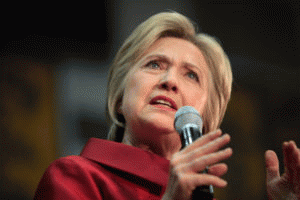From Consortium News

Former Secretary of State Hillary Clinton speaking with supporters at a campaign rally in Phoenix, Arizona, March 21, 2016.
(Image by (Photo by Gage Skidmore)) Details DMCA
Two months after the defeat of Hillary Clinton, the most cohesive message from congressional Democrats is: blame Russia. The party leaders have doubled down on an approach that got nowhere during the presidential campaign -- trying to tie the Kremlin around Donald Trump's neck.
Still more interested in playing to the press gallery than speaking directly to the economic distress of voters in the Rust Belt and elsewhere who handed the presidency to Trump, top Democrats would much rather scapegoat Vladimir Putin than scrutinize how they've lost touch with working-class voters.
Meanwhile, the emerging incendiary rhetoric against Russia is extremely dangerous. It could lead to a military confrontation between two countries that have thousands of nuclear weapons each.
At the Senate Armed Services Committee hearing last Thursday on foreign cyber threats, ranking member Jack Reed, D-Rhode Island, denounced "Russia's rejection of the post-Cold War international order and aggressive actions against its neighbors," and he condemned "a regime with values and interests so antithetical to our own." It was the kind of oratory that would have made John Foster Dulles or Barry Goldwater proud.
Like so many other senators on the committee, Reed seemed eager for a new Cold War while accusing Russia of digital aggression. "In addition to stealing information from the Democratic National Committee and the Clinton campaign," he said, "and cherry-picking what information it leaked to the media, the Russian government also created and spread fake news and conspiracies across the vast social media landscape.''
The Russia-Did-It Conspiracy Theory
The Russian government may have hacked the DNC and Clinton campaign emails, and it may have given those emails to WikiLeaks. But that's hardly a slam dunk.
Over the weekend, after Friday's release of a much-ballyhooed report from the office of Director of National Intelligence James Clapper, the report underwent a cogent critique by former Associated Press and Newsweek reporter Robert Parry. Stripping the 25-page DNI report down to its essence, Parry pointed out that it "contained no direct evidence that Russia delivered hacked emails from the Democratic National Committee and Hillary Clinton's campaign chairman John Podesta to WikiLeaks."
Parry added: "The DNI report amounted to a compendium of reasons to suspect that Russia was the source of the information -- built largely on the argument that Russia had a motive for doing so because of its disdain for Democratic nominee Clinton and the potential for friendlier relations with Republican nominee Trump. But the case, as presented, is one-sided and lacks any actual proof."
While stenographic accounts of official claims have dominated coverage of the Jan. 6 report, major flaws are coming to light in mainstream media. For instance, a piece that appeared on Saturday in the New York Times, by Scott Shane, reported in its ninth paragraph: "What is missing from the public report is what many Americans most eagerly anticipated: hard evidence to back up the agencies' claims that the Russian government engineered the election attack."
The article reported: "Under the circumstances, many in Washington expected the agencies to make a strong public case to erase any uncertainty. Instead, the message from the agencies essentially amounts to 'trust us.' There is no discussion of the forensics used to recognize the handiwork of known hacking groups, no mention of intercepted communications between the Kremlin and the hackers, no hint of spies reporting from inside Moscow's propaganda machinery."
No Doubts
But Democratic lawmakers aren't interested in doubts or caveats. They believe the Russian hacking issue is a political winner. Whether or not that's true, it's certainly a convenient way to evade the sobering lessons that should have been learned from the last election about the Democratic Party's lack of authenticity in its claims to be fighting for the interests of working people.
(Note: You can view every article as one long page if you sign up as an Advocate Member, or higher).






